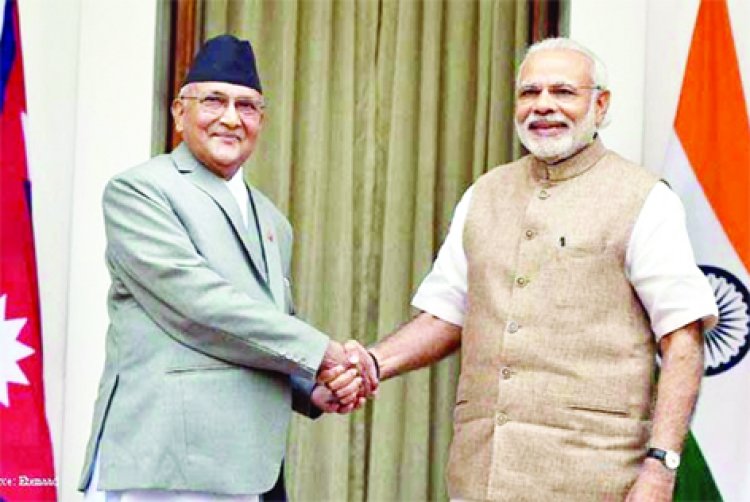INDIA - NEPAL: ATTEMPT TO RESET TIES
Asia News Agency Editorial Board

Indian Army Chief Gen MM Naravane, on a three-day visit last week, met his Nepalese counterpart Gen Purna Chandra Thapa Thursday and discussed measures to further bolster the existing bond of friendship and cooperation between the two armies. His visit was largely aimed at resetting the bilateral ties that came under severe strain following a bitter border row.
They exchanged views on issues of bilateral interests and discussed measures to further strengthen the existing bond of friendship and cooperation between the two armies, according to the Nepal Army headquarters' press statement.
As is customary, President Bidhya Devi Bhandari conferred the honorary rank of General of Nepali Army on General Naravane. The ceremony was attended by the Prime Minister of Nepal K.P. Sharma Oli. The practice follows a seven decade old tradition of conferring Army Chiefs of each other's country with the honorary title.
Background to the visit
The decision to send the Army chief to Nepal to reset the ties is seen as part of a larger exercise by New Delhi to rejuvenate relations with Myanmar, the Maldives, Bangladesh, Sri Lanka, Bhutan and Afghanistan in the wake of greater efforts by China to expand its influence in the region.
The ties between the two countries came under strain after Defence Minister Rajnath Singh inaugurated an 80-km-long strategically crucial road connecting the Lipulekh pass with Dharchula in Uttarakhand on May 8.
Nepal protested the inauguration of the road claiming that it passed through its territory. Days later, Nepal came out with the new map showing Lipulekh, Kalapani and Limpiyadhura as its territories.
After Nepal released the map, India reacted sharply, calling it a "unilateral act" and cautioning Kathmandu that such "artificial enlargement" of territorial claims will not be acceptable to it.
In June, Nepal's Parliament approved the new political map of the country featuring areas which India maintains belong to it. India termed as untenable the "artificial enlargement" of territorial claims by Nepal.
India said Nepal's action violates an understanding reached between the two countries to resolve the boundary issues through talks. Nepal Prime Minister Oli has been asserting that Lipulekh, Kalapani and Limpiyadhura belong to Nepal and vowed to "reclaim" them from India. The Lipulekh pass is a far western point near Kalapani, a disputed border area between Nepal and India.
Both India and Nepal claim Kalapani as an integral part of their territory - India as part of Uttarakhand's Pithoragarh district and Nepal as part of Dharchula district.
Special relationship between the two armies
Army Chief General MM Naravane visit to Nepal last Wednesday, emphasises, according to the Hindustan Times, the importance of the ties between the two armies that “are a fundamental pillar which is based on history, contemporary partnership, symbolic respect and organic ties. The Indian and Nepali army chiefs are honorary generals of each other’s armies; there is deep camaraderie between retired and senior officers of both armies, many of whom have trained together in their younger days……..
“This relationship has assumed importance in the last two decades — both during the civil war in Nepal and during the peace process. It was on the then Indian foreign secretary Shyam Saran’s advice that the then Royal Nepalese Army chief, Pyar Jung Thapa, went to the autocratic monarch, Gyanendra Shah, in 2006, and told him that the military could not suppress popular aspirations anymore. This led to the restoration of democracy. And it was when the Nepal army was concerned about attempts by Maoists to ‘politicise’ its structure and alter the chain of command that India stepped in and encouraged the ouster of the Maoist-led government in 2008. It was because of this depth of ties that General Naravane’s public suggestion — it was unwarranted, coming from him — that Kathmandu was raising the border dispute at Chinese prodding had an impact on the relationship.
“So, it is only fitting that the Army chief is going to Nepal as a gesture of India’s commitment to maintaining institutional ties with key elements of the Nepali State. The Nepal army has been clear that the relationship with India is important and, even while engaging with China, has resisted its government’s attempts to drag it into geopolitical games…..”
















